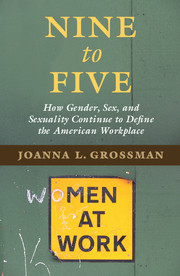Book contents
- Frontmatter
- Dedication
- Contents
- Foreword
- Acknowledgments
- Introduction
- PART I WHAT IS SEX DISCRIMINATION?
- PART II SEXUAL HARASSMENT
- PART III PREGNANT WOMEN AND MOTHERS AT WORK
- 31 Pregnant Truckers and the Problem of Light-Duty Assignments
- 32 A Big Win for Pregnant Police Officers
- 33 Undue Burden
- 34 Hard Labor: New Pregnancy Discrimination Guidance from the EEOC
- 35 Forceps Delivery: The Supreme Court Narrowly Saves the Pregnancy Discrimination Act in Young vs. UPS
- 36 The Pregnancy Discrimination Act Reaches Advanced Maternal Age
- 37 The Pregnant Workers’ Fairness Act: A Time for Change?
- 38 The Supreme Court Deals a Blow to Once-Pregnant Retirees
- 39 If She Does Not Win It Is a Shame
- 40 Must Employers Who Cover Prescriptions Cover Contraception?
- 41 Fertile Ground for Discrimination
- 42 Can a Woman Be Fired for Absenteeism Related to Fertility Treatments?
- 43 Is Lactation Related to Pregnancy?
- 44 A Victory for Families, but Hardly a Panacea
- 45 A Small Step in the Right Direction: The Family and Medical Leave Act at Twenty
- 46 “Best Practices” to Promote Work-Family Balance
- PART IV FEMALE BREADWINNERS AND THE GLASS CEILING
- Conclusion
- Notes
- Index
43 - Is Lactation Related to Pregnancy?
from PART III - PREGNANT WOMEN AND MOTHERS AT WORK
Published online by Cambridge University Press: 05 May 2016
- Frontmatter
- Dedication
- Contents
- Foreword
- Acknowledgments
- Introduction
- PART I WHAT IS SEX DISCRIMINATION?
- PART II SEXUAL HARASSMENT
- PART III PREGNANT WOMEN AND MOTHERS AT WORK
- 31 Pregnant Truckers and the Problem of Light-Duty Assignments
- 32 A Big Win for Pregnant Police Officers
- 33 Undue Burden
- 34 Hard Labor: New Pregnancy Discrimination Guidance from the EEOC
- 35 Forceps Delivery: The Supreme Court Narrowly Saves the Pregnancy Discrimination Act in Young vs. UPS
- 36 The Pregnancy Discrimination Act Reaches Advanced Maternal Age
- 37 The Pregnant Workers’ Fairness Act: A Time for Change?
- 38 The Supreme Court Deals a Blow to Once-Pregnant Retirees
- 39 If She Does Not Win It Is a Shame
- 40 Must Employers Who Cover Prescriptions Cover Contraception?
- 41 Fertile Ground for Discrimination
- 42 Can a Woman Be Fired for Absenteeism Related to Fertility Treatments?
- 43 Is Lactation Related to Pregnancy?
- 44 A Victory for Families, but Hardly a Panacea
- 45 A Small Step in the Right Direction: The Family and Medical Leave Act at Twenty
- 46 “Best Practices” to Promote Work-Family Balance
- PART IV FEMALE BREADWINNERS AND THE GLASS CEILING
- Conclusion
- Notes
- Index
Summary
A prominent contributor to Rick Santorum's 2012 presidential campaign startled audiences by suggesting that Bayer aspirin could be used as a reliable method of contraception. The contributor, Foster Friess, in an interview with MSNBC host Andrea Mitchell, insisted that “back in [his] day,” aspirin was a surefire way to prevent pregnancy.
How exactly would that work? Friess explained, “The gals put it between their knees.” In other words, aspirin-clenching knees would prevent conception by preventing sex. An added bonus: this aspirin method of contraception, claimed Friess, “wasn't that costly.” Friess was, of course, joking, although I doubt that many women were laughing. But the recent fight over the scope of the religious exemption to the provision of the federal health care reform law – which requires comprehensive insurance plans to provide coverage for prescription contraceptives at no cost to the user – is no joke. It's a dead serious, highly contested issue.
The new federal law mandates that insurance plans must cover prescription contraceptives at no cost to the women who use them. The mandate resulted from a report by the Institute of Medicine finding that access to contraception is essential to women's health, and that contraception is insufficiently accessible to many women.
Beginning in August 2012, contraception will be one of several preventive health services that must be included in health insurance plans, at no cost to the user. The Catholic Church strenuously objects to the mandate, and has been locked in a bitter battle with the Obama administration over the scope of the religious exemption. The exemption, as embodied in a final ruling of the Department of Health and Human Services in December 2011, was narrow – applying only to churches and other houses of worship. However, the Obama administration backtracked a bit after a furious backlash ensued. The administration has now agreed to a compromise that will guarantee employees of religiously affiliated organizations (such as certain hospitals and universities) access to prescription contraceptives at no cost, but will also ensure that the insurance company, rather than the employer, foots the bill.
Putting the religious issues aside, though, this controversy about the federal mandate for contraceptive coverage is merely the latest battle in a long-running war – variously involving employers, employees, insurance companies, state governments, and the federal government – about whether women, alone, should bear all the consequences, costs, and hardships of reproduction.
- Type
- Chapter
- Information
- Nine to FiveHow Gender, Sex, and Sexuality Continue to Define the American Workplace, pp. 249 - 253Publisher: Cambridge University PressPrint publication year: 2016



